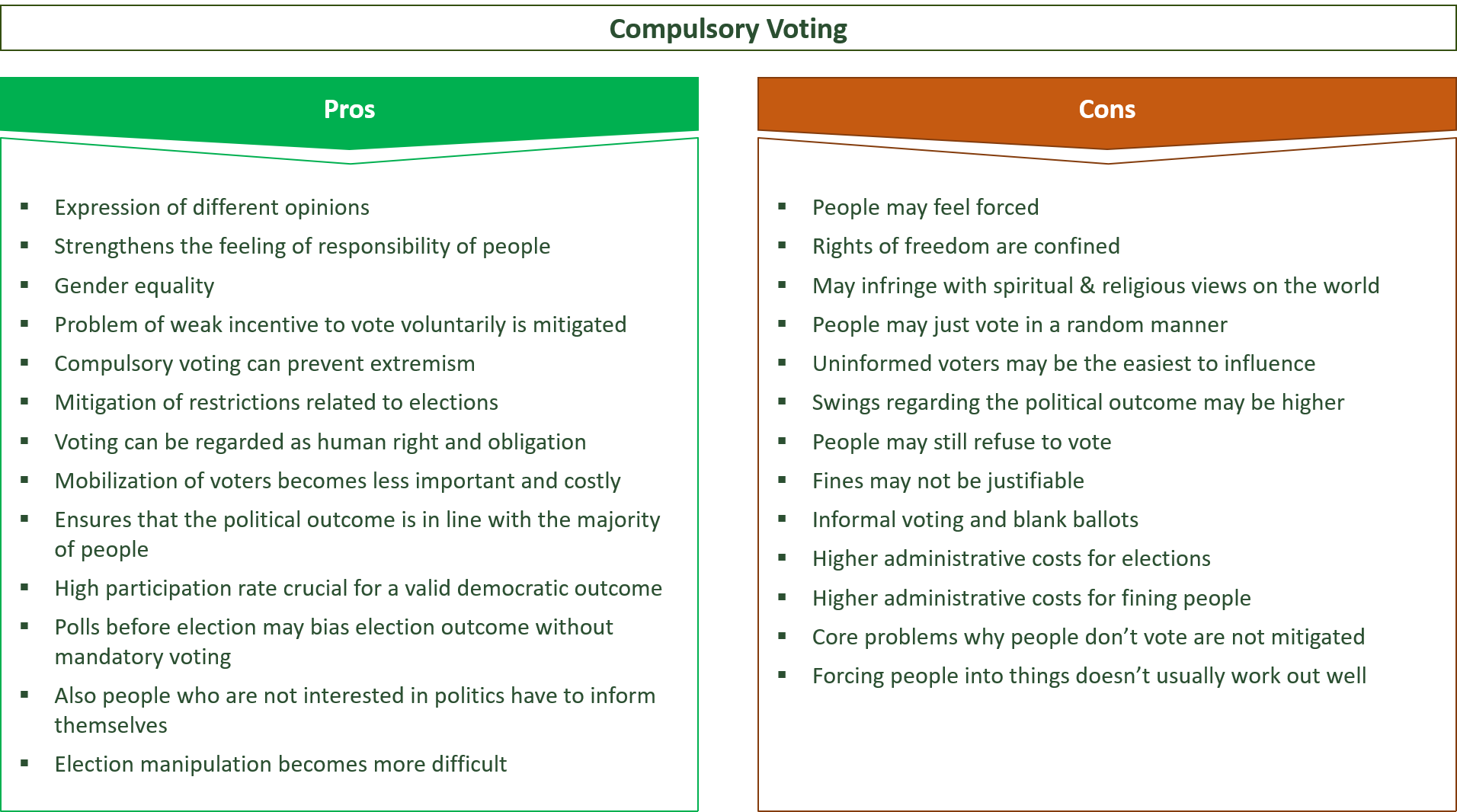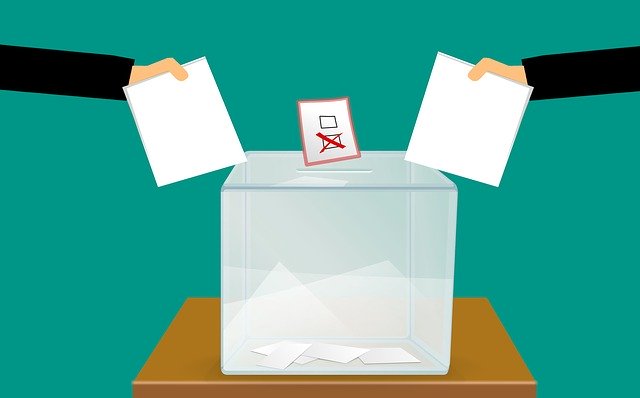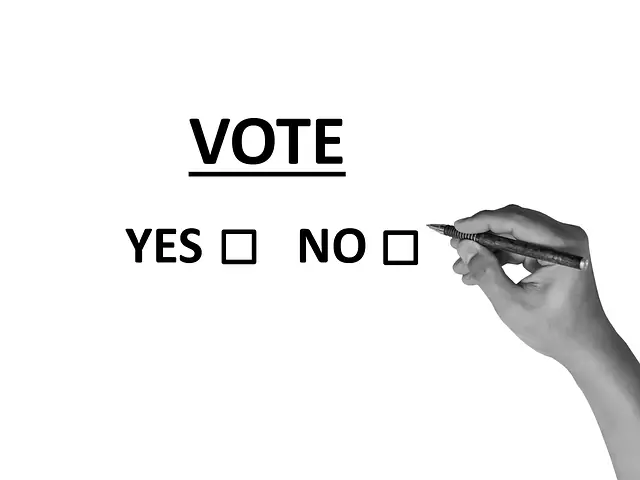“People aren’t as stupid as politicians think. More and more of us are laughing off our ‘civic duty’ to vote, rejecting the role of compulsory constituent.”
Bob Black, Activist
Advantages & Disadvantages of Compulsory Voting

Compulsory voting (often also referred to as mandatory voting) describes the obligation for people to participate in elections in the respective country or region.
Depending on the country, there might even be serious sanctions if people refuse to vote.
Even though voting is important and mandatory voting has some advantages, there are also many problems related to it.
In this article, the pros and cons of compulsory voting are shown.
Audio Lesson
Contents
List of Countries where Voting is Mandatory (currently 22)
- Argentina
- Australia
- Belgium
- Bolivia
- Brazil
- Democratic Republic of the Congo
- Costa Rica
- Dominican Republic
- Ecuador
- Egypt
- Greece
- Honduras
- Lebanon
- Luxembourg
- Mexico
- Nauru
- Panama
- Paraguay
- Peru
- Singapore
- Thailand
- Uruguay

Advantages of Compulsory Voting
- Expression of different opinions
- Strengthens the feeling of responsibility of people
- Gender equality
- Problem of weak incentive to vote voluntarily is mitigated
- Compulsory voting can prevent extremism
- Mitigation of restrictions related to elections
- Voting can be regarded as human right and obligation
- Mobilization of voters becomes less important and costly
- Ensures that the political outcome is in line with the majority of people
- High participation rate crucial for a valid democratic outcome
- Polls before election may bias election outcome without mandatory voting
- Also people who are not interested in politics have to inform themselves
- Election manipulation becomes more difficult
Expression of different opinions
One important advantage of compulsory voting is that it requires people to express their political opinion.
This can be especially important in regions with quite unstable political conditions where every vote counts to prevent unpleasant outcomes for the entire population.
Thus, the expression of political opinions is crucial in order to get a solid political outcome, which represents the preferences of the local population.
Strengthens the feeling of responsibility of people
Through mandatory voting, people may also feel a greater level of responsibility regarding their participation in political topics.
Politics are a quite important topic and our future will be significantly determined by political decisions.
Thus, it might be a good idea to raise awareness regarding the importance of taking part in elections so that people realize that they have the power to determine how their future might look like.
Gender equality
If everyone has to vote, there is also less room for gender inequality.
For instance, in some countries, women are still not treated as equally important as men and men may not allow their wives to participate in elections and might force them to stay at home instead.
However, if the participation in elections is compulsory, many more women may get the opportunity to vote since their husbands may want to avoid that the family is fined.
Thus, overall, compulsory voting may also strengthen the rights of women all over the world.
Problem of weak incentive to vote voluntarily is mitigated
Since the impact of everyone of us on political outcomes is only minimal, everyone of us may have an incentive to refrain from voting and stay at home and follow our hobbies instead.
This is a known issue and has been extensively examined by many scientists all over the world.
Thus, in order to get as many people as possible to participate in elections, it may be crucial to make voting mandatory since people may not have a big enough incentive to do so.
This is especially important if voting requires plenty of effort of people.
For instance, if people live quite remotely off the grid, it may take them many hours to get to the next voting facility and they will likely not be willing to take this effort for the minimal impact each vote has on the overall outcome.
Compulsory voting can prevent extremism
Compulsory voting may also be important in order to prevent extremist groups to gain power.
The higher the number of people that participate in elections, the bigger the chance that a solid government that supports the majority of the population is elected and excessive power for radical movements can be prevented.
Therefore, especially in countries where radical movements begin to rise, it may be a good idea to force all people to vote in order to avoid unpleasant political outcomes in the future.
Mitigation of restrictions related to elections
There might also be restrictions of many sorts that may prevent people to engage in elections.
For instance, some people may have to work on election day and may not be able to vote.
Some may have mobility issues since they might not own a car and may therefore not be able to get to the next polling booth.
By making voting mandatory, people will no longer be able to find excuses not to vote and may have to arrange their day in a way that they are able to participate in elections.
Voting can be regarded as human right and obligation
Many people also state the opinion that voting should be an obligation to everyone of us since it can be considered to be a main human duty to do so.
We all should feel the responsibility to vote in a way that ensures a livable future for us and for the next generations.
Thus, it may also be crucial from an environmental perspective to participate in elections in order to avoid unpleasant political outcomes that may contribute to serious environmental problems.
Mobilization of voters becomes less important and costly
Another upside of compulsory voting is that it may become less costly to mobilize voters.
For instance, if participating in elections is not mandatory, politicians often have to motivate their interest groups to vote for them.
However, if people are forced to vote, there is less need to mobilize voters since they have to vote anyway.
Therefore, the overall costs for election campaigns may also drop due to the introduction of mandatory voting practices.
Ensures that the political outcome is in line with the majority of people
Compulsory voting also contributes towards a voting outcome where the interests of the majority of the population are represented.
For instance, if too many people refuse to vote, the outcome of the election may not be in line with the needs of the majority of the population since minor parties may be voted instead, which may not care about the preferences of the majority of locals.
Thus, it is crucial that the turnout is high enough so that the main concerns of the general public are represented by the election outcome and by the politicians that are voted.
High participation rate crucial for a valid democratic outcome
A working democracy lives from high election participation.
Only if enough people vote, there will be a truly democratic outcome where the preferences of the majority of the population are represented by politicians.
Thus, especially in regions where the turnout is usually rather low and people seem not to be interested in politics, mandatory voting may be a valid tool in order to increase the turnout.
Polls before election may bias election outcome without mandatory voting
Polls are often conducted before the election has actually taken place.
However, by doing so, those polls may bias the outcome of an election.
For instance, if polls say that one party will win the election, people who wanted to vote for another party may no longer see any sense in participating in the election since they might think that their vote will not be enough to change the outcome.
Thus, if voting is not mandatory, people may lose their motivation to vote and this may in turn significantly bias the overall outcome of an election, especially since polls are often subject to high levels of uncertainty.
Also people who are not interested in politics have to inform themselves
Another benefit of compulsory voting is that all people have to inform themselves to a certain extent since they are forced to vote.
Even people who have previously not been interested in politics at all might now want to educate themselves about the different parties in order to at least vote someone who represents their interests rather than a random guy.
Election manipulation becomes more difficult
The more people vote, the lower the chance for election manipulations.
For instance, it might be easy to manipulate the outcome of a few polling locations.
However, the more people vote, the higher the number of people that are involved in the count of votes and the lower the probability that elections can be manipulated.
Thus, mandatory voting may also prevent voting manipulations to a certain extent.

Disadvantages of Mandatory Voting
- People may feel forced
- Rights of freedom are confined
- May infringe with spiritual & religious views on the world
- People may just vote in a random manner
- Uninformed voters may be the easiest to influence
- Swings regarding the political outcome may be higher
- People may still refuse to vote
- Fines may not be justifiable
- Informal voting and blank ballots
- Higher administrative costs for elections
- Higher administrative costs for fining people
- Core problems why people don’t vote are not mitigated
- Forcing people into things doesn’t usually work out well
People may feel forced
Although there are many upsides regarding mandatory voting, there are also some problems related to it.
One disadvantage of compulsory voting is that people may feel forced into elections and may not be willing to accept this.
There may be demonstrations against compulsory voting, which may even get out of control.
Thus, if people do not accept the concept of compulsory elections at all, the introduction of this concept may do more harm than good.
Rights of freedom are confined
Opponents of compulsory voting often also argue that the freedom of human rights is confined through the mandatory participation of elections.
People should decide on their own whether they want to vote or not and should not be forced to do so at all.
Moreover, this loss in freedom may also lead to a state of frustration, which may result in people voting radical parties instead of parties that would truly be able to move a country in a positive direction.
May infringe with spiritual & religious views on the world
Another downside of compulsory voting is that it may not be in line with religious or spiritual views on the world.
For instance, some religious orientations do not allow their members to engage in political decisions at all.
Thus, also voting would violate their beliefs and compulsory voting would confine the rights to practice those religious orientations in a proper manner.
People may just vote in a random manner
People who are forced to participate in elections may also just vote in a rather random manner.
This is also known as the donkey vote.
However, by voting randomly without any intention behind it, this could lead to unpleasant political outcomes, especially in small constituencies where a single vote can have a significant impact on the election outcome.
Thus, under certain conditions, donkey votes which are caused by mandatory voting regulations may lead to serious political problems in the respective region.
Uninformed voters may be the easiest to influence
People who usually do not care about politics at all might also be the easiest to influence.
For instance, if radical movements propose some benefits to those people, chances are that those uninformed and uninterested voters will vote those radical movements, which may lead to serious political distortions and catastrophic long-term effects.
Swings regarding the political outcome may be higher
If there are many people who do not actually want to vote at all and those people just vote randomly in order not to spend any energy on the election, the swings regarding the overall political outcome may become higher, especially in swing states where a relatively low number of votes can vastly change the election outcome.
People may still refuse to vote
Another issue with compulsory voting is that nobody can actually be forced to vote.
For instance, some people might just accept to be fined a few bucks and will not care too much about it.
Thus, if fines are rather low, many people will just ignore the fact that voting is mandatory since they do not have to fear too harsh consequences in case they do not participate in elections.
Fines may not be justifiable
Opponents of mandatory voting also often claim that fines related to the violation of the compulsory voting principle are not justifiable at all since people should be free in their decision whether they want to vote or not and should not get fined for insisting on their human right for freedom of choice.
Hence, also from an ethical perspective, compulsory voting and the related fines for violations may be rather questionable.
Informal voting and blank ballots
People who do not want to vote may also become quite unmotivated and might just engage in informal voting, meaning that they just vote in a manner that is not in line with the election regulations and their votes will not be counted due to this.
Thus, even we force people to vote, this is still no guarantee that there are significantly more valid ballot papers.
Higher administrative costs for elections
If more people participate in elections, chances are that also the overall costs for those elections will increase since the effort to monitor the election process and also to count the votes will increase with the number of people participating in the election.
Therefore, due to the increasing manpower that is needed, also the costs for election may increase significantly.
Higher administrative costs for fining people
Apart from the higher costs for elections, mandatory voting may also lead to higher administrative costs for fining people who refused to engage in the election.
Thus, the costs for municipalities related to compulsory voting practices may increase even further.
Core problems why people don’t vote are not mitigated
There are often serious reasons why people do not want to participate in elections.
Many of them are frustrated due to unpleasant political outcomes in the past and also due to their overall poor living conditions.
However, compulsory voting does not solve any of those problems, it only prevents the symptoms.
Therefore, instead of introducing compulsory voting practices, governments may rather want to focus on solving the problems of the local population so that people get a higher level of motivation to voluntarily participate in elections.
Forcing people into things doesn’t usually work out well
There are many examples from the past which show that forcing people into things they actually do not want to do at all is often not a good idea.
This also applies to voting.
The freedom of people is a precious thing and it is quite questionable whether compulsory voting will lead to favorable outcomes in the long run.

Top 10 Compulsory Voting Pros & Cons – Summary List
| Compulsory Voting Pros | Compulsory Voting Cons |
|---|---|
| Expression of political attitude | People are forced into voting |
| Human obligation to vote | Loss of freedom |
| People have to inform themselves about politics | People may get frustrated |
| Compulsory voting may prevent extremism | Donkey votes |
| Mitigation of gender inequality | Increase in informal votes |
| Interests of the majority are represented | Higher costs related to elections |
| Mitigation of election restrictions | Higher administrative costs to fine people |
| Election manipulations become less likely | People may still refrain from voting |
| Weak incentive to vote without obligation | Core problems are not solved |
| Mobilization of voters becomes less important | Forcing people is often not a good idea |
Is Compulsory Voting Necessary?
As we have seen before, there are plenty of advantages related to mandatory voting.
However, compulsory voting also implies serious problems.
In my opinion, compulsory voting is not necessary and can do more harm than good.
Instead, people should be educated and motivated so that they have an inner motivation to participate in elections instead of forcing them to vote.
Sources
https://en.wikipedia.org/wiki/Compulsory_voting
https://www.idea.int/data-tools/data/voter-turnout/compulsory-voting

About the author
My name is Andreas and my mission is to educate people of all ages about our environmental problems and how everyone can make a contribution to mitigate these issues.
As I went to university and got my Master’s degree in Economics, I did plenty of research in the field of Development Economics.
After finishing university, I traveled around the world. From this time on, I wanted to make a contribution to ensure a livable future for the next generations in every part of our beautiful planet.
Wanna make a contribution to save our environment? Share it!
